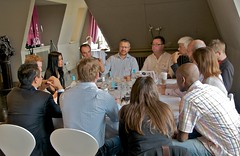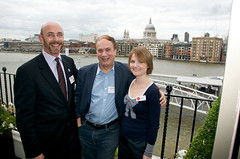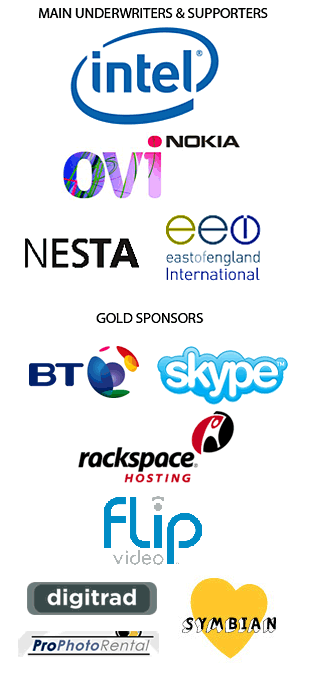Archive for 'Traveling Geeks'
Video of Howard Rheingold talk in London on 21st Century Literacies
This is my edit of a talk on 21st century literacies that I gave in London at the Reboot Britain conference in July, 2009. It was part of the action-packed, fun-filled Travelling Geeks tour. About 40 minutes. {Original link: Howard Rheingold on 21st Century Literacies.}
[bliptv 2373937]
Moor hen!
Here's a moor hen on the River Cam in Cambridge.
Yes, I'm easily entertained.
Economics of Privacy in Social Networks
Asks Ross Anderson on a Cambridge economics and security resource page: do we spend enough on keeping ‘hackers’ out of our computer systems? Do we not spend enough or do we spend too much? Do we spend too little on the police and the army, or too much? And do we spend our security budgets on the right things?
Dr. Richard Clayton’s work at the University of Cambridge tackles these issues and more. (more…)
Random Thoughts on Social Media & Newspapers
From The Guardian Live Event Podcast in London this month, I spent more time tweeting the event than thinking about creative things to say about the decline of newspapers that hasn’t already been said a million times before.
A few random thoughts in a 140-like format from what the panelists and audience threw out during the event:
Ten metropolitan papers across the country may be closed by the end of the year in the U.S.
Subscribers are leaving papers, although they may choose to read it in a different format, perhaps on a kindle.
We learned about Michael Jackson’s death through Twitter.
We’re all the media now, but it’s important for us to make some distinctions.
The New York Times and other majors are not always right, but we create our own levels of credibility over time.
Now, it’s up to us as individuals to have better crap detectors, it’s important for that kind of media literacy to sink in with the general public.
Organizations like the BBC can hang onto their brand by not necessarily being first on a particular news story. Why leap on the news when there’s other important stuff to report on.
Talk about what you know now because that’s what you know now.
Once you press the button, you can’t change it. That’s why we have put six layers of safety around the production process.
The Telegraph has proved the value of exclusives. Exclusivity has a diminishing commodity value because of the nature of how quickly stories can get out there.
The thing about Twitter is that the barrier to entry has dropped to an SMS message.
The barrier is really low on Twitter – there’s actually a guy who’s building supply chain toys in China who is using Twitter.
The thing about Twitter is that it works on every phone. People in the developing world can get as much utility out of Twitter as we do because they can use it on their cell phones.
Charterhouse Square
Part of our stay during our recent London trip was at the Malmaison Hotel, which is around the corner from the Barbicon tube on the circle line. Despite the fact that I lived in London and had countless subsequent visits, it’s an area where I never spent that much time.
Malmaison is in the corner of a quaint courtyard called Charterhouse Square.
Here’s a little background which will make all Americans feel incredibly young regardless of where they grew up in the states.
The Charterhouse is on the site of a former Carthusian monastery founded in 1371, by Walter de Manny, on what is now the north side of the square. It was established near a 1348 plague pit, located in the square, which formed the largest mass grave in London during the Black Death when around half the population died of the plague.
Tens of thousands of bodies were buried here. The name is derived as an Anglicization of La Grande Chartreuse, whose order founded the monastery.
It’s no wonder we look at the world differently than our Anglican pals on the other side of the pond.
UK Diary: Friday – Looking For Ghosts In Peterhouse College Founded 1284
http://www.youtube.com/watch?v=t8z7odjIZdw
After a hard-packed day of visiting with Cambridge startups, government agency representatives, Cambridge tech incubator, meeting with Nokia research labs, meeting with Microsoft Research Labs – and punting on the river Cam, the Traveling Geeks are invited to dinner at Peterhouse College.
According to my excellent guidebook “Cambridge Colleges” by Janet Jeacock, Peterhouse College features one of the finest collections of Pre-Raphaelite stained glass, by Morris, Burne-Jones, and Madox Browne. It is the oldest of all 31 Cambridge University colleges, founded in 1284.
As the rest of the TGers are shmoozing on the lawn, my son Matt and I explore the building. We’re hoping to find some ghosts. Please see the short video above.
Next: More Cambridge innovation. . .
Cambridge Traveling Geeks TweetUp #TG2009
We had the most gorgeous setting for a TweetUp ever, arranged by Karyn Barnes of East of England. Thank you, Karyn!
Below are a few choice photos and links to larger sets. If anyone else has photos, please let me know.
Flickr Set from Susan Bratton
http://www.flickr.com/photos/luvlotus/sets/72157621345333391/
Flickr Set from Mark Littlewood
http://www.flickr.com/photos/39952434@N04/sets/72157621295932914/
Leading Memory Lane
I had an interesting chat at the TechCrunch Europe Awards with Sven Hock of Kingston Technology Company.
They’re over twenty years old and tout themselves as the world’s independent memory leader. Kingston offers more than 2,000 memory products that support nearly every device that uses memory, from computers, servers and printers to MP3 players, digital cameras and cell phones.
Kingston also provides contract manufacturing and supply chain management services for semiconductor manufacturers and system OEMs.
Life in London: Does Fun Have an ROI?
I did very little blogging while I was in London, but it wasn't because I didn’t find anything interesting to write about. It’s because I was talking, laughing, eating or drinking nearly every moment of my two-week trip. I proudly announced to my husband that I hadn’t taken a single Ambien during the visit. Unfortunately, it wasn't because of some no-jet-lag magic, it was because I only got about two hours of sleep a night.
Every time I visit London I find a city with zero downtime filled with entrepreneurs, investors and the like who are offering to take me for afternoon tea or a drink to talk about the industry or well, just talk into wee hours of the morning. One Oli Barrett even serenaded me with several songs from Mary Poppins and Chitty Chitty Bang Bang late after the TechCrunch Europa awards. After all, that’s how we Americans all think the British talk, right? That’s pretty accommodating stuff.
And look no further than these pictures to see how much fun Scoble was having. Even Last.fm had a sense of humor when a TechCrunch editor stormed their offices somewhat unannounced. (Michael Arrington? Less of a sense of humor about that post. Sorry, Mike.) People are intense about their companies, but there’s a sense in the UK that it’s not the only thing that matters.
The joviality is all the more surprising given the rough times UK start-ups are having, as I detailed today on TechCrunch. Money available for early stage start-ups is perilously low and good many entrepreneurs I know have already closed their companies or sold them on the cheap. But here they are all still hanging out, supporting one another, having wild parties and enjoying life. It’s as if (gasp!) the world doesn’t revolve around the Internet.
As a business reporter, I’m of two minds on whether this is a good thing or a bad thing. I’m a big believer that there’s no such thing as work-life balance when it comes to start-ups—a view that frequently gets me in trouble especially when I’m talking about why there aren’t more women in the business. But sometimes the Valley takes the macho-look-at-me-working-24-hrs-a-day thing too far. Startup or no, I’m not sure I know anyone who works just 40 hours a week here, and I know I don’t know anyone who isn’t checking their email every minute of the day. The debate about whether that’s healthy is one thing—but does it actually make us more successful?
How are the US and UK Different in Our Approach to Social Media? #TG2009
Here’s an interview done at Econsultancy in London where they asked me about the differences between the US and UK with regard to start ups, innovation, and social media.

- Image by SusanBratton via Flickr

- Image by jdlasica via Flickr

- Image via CrunchBase

- Image by jdlasica via Flickr


![Reblog this post [with Zemanta]](https://img.zemanta.com/reblog_e.png?x-id=6123fb23-a7ca-4496-953b-71e38b90af22)



![Reblog this post [with Zemanta]](https://img.zemanta.com/reblog_c.png?x-id=f47b6592-ba96-48cb-8320-e8acb0dffc6a)
![Reblog this post [with Zemanta]](https://img.zemanta.com/reblog_c.png?x-id=5045bb61-b33b-44ba-ac01-be105b3e929c)
